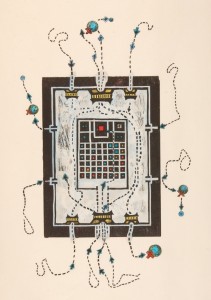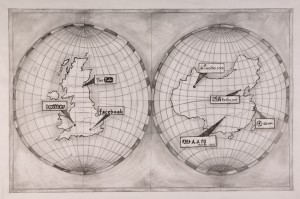Democracy as internet | Democracy as ideal
Discussions regarding democracy are endlessly complicated in this economic and social climate, where labelled ‘democratic states’ are discovered to be riddled with corruption, repeating hierarchies and decisions imposed upon its inhabitants without consent.
Let us consider democracy through this definition –
‘Democracy in its purest or most ideal form would be a society in which all adult citizens have an equal say in the decisions that affect their lives.[1]
In Western societies, we have the opportunity to vote for those that will lead us from above, we have laws that will intend to protect our human and civil rights and we generally have freedom to move and do what we wish.
I was aware that within the PRC this behavioural freedom was not possible from the short period of time I lived there. Through conversations with artists, students and other locals – the government controls everyday thoughts and suppresses requests for change. Physical evidence of discussion of governmental control is also highly censored – there is to be no mention of issues such as Tiananman Square or Tibet, and if there is, the perpetrator is severely punished. The information board at my own exhibition in Chongqing, which explored issues of online ‘redirection and network timeout’, was amended when translated into Manadarin so as not to offend. However, through quiet conversation with other artists we discussed these matters carefully.
Concrete hierarchies within the communities I met were evident. I was most personally upset by how females still have such low status within society. Challenging, opinionated and confident women, such as the few female University Art Lecturers I met, were kept in a separate category to the ‘beautiful’ submissive females destined to be homemakers from the age of 25 years old. Men should have a wife, and mistresses are accepted as the norm. Similarly, female prostitution is commonplace, with a tiered system of clients and prices on offer.
Other equality and safety issues became evident, although China has entirely avoided the overly sanitised bureaucratic approach we take to living our daily lives in the West. In some ways, if was as if time had been rewound by 60 years or so.
Democracy is an ideal, almost utopian state of affairs, where can equally contribute to the formation and control of the world we live in. The internet offers us boundless opportunities to communicate our own opinions, generate information, knowledge and form forces that are evidently powerful from recent political movements that have been carried on social networking sites. Theorists such as Geert Lovink advocate the power of the activist potential of online space and communication. But of course, you must be able to access the sites to begin with to be able to offer any personal thought or contribution.
Is there hope for a democratic or libertarian approach to digital space within the PRC? The governing of the digital space closely mirrors the governing of the physical space, but without the opportunity for antagonism can there be any possible development for democracy? As China continues to trade globally it promises to adjust its internet governance to reflect this international position. Time will tell.
[1] Larry Jay Diamond, Marc F. Plattner (2006). Electoral systems and democracy p.168. Johns Hopkins University Press, 2006

